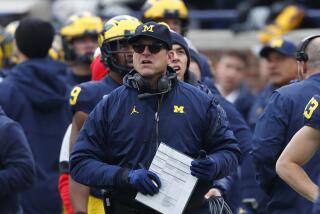Jurors Say Fullerton’s Case Not Supported by Evidence
- Share via
SANTA ANA — Lack of a paper trail leading to the decision to fire Jim Huffman, and unconvincing testimony from some defense witnesses proved most costly to Cal State Fullerton, according to jurors who awarded the former Titan volleyball coach $1.35 million in damages Tuesday.
Jurors, who were allowed to discuss the wrongful-termination case for the first time Wednesday, said they did not believe school administrators’ claims that the decision to fire Huffman was based on job performance or was made in the fall of 1991.
Huffman’s attorneys argued that the firing on March 23, 1992, was in retaliation for Huffman’s gender-equity lawsuit that blocked the school’s attempt on Jan. 28, 1992, to drop volleyball, forced athletic department policy changes and embarrassed the school.
“I was waiting for the defense to come up with some documentation for when the decision to terminate was made,” said Lori Horwitz, a clinical social worker from Orange. “There has to be minutes from meetings or a definite date. This was a major decision, but they couldn’t give a day or a week that it was made. That was key.”
Jury forewoman Angela Williams, an Orange resident and news assistant for the Orange County Register, said she noticed distinct differences in witnesses.
“The plaintiff’s witnesses gave evidence that backed their story, their testimony was clear, glowing and made without hesitation,” she said. “With the defense witnesses, there was a lot of pausing, a lot of them asked, ‘Can you repeat the question?’ and there was a lot of changing stories.
“We felt Cal State Fullerton really did (Huffman) wrong, and the school didn’t have any real strong evidence to back their reasons for firing him.”
Fullerton Athletic Director Bill Shumard, deemed by the jury to be most culpable of the defendants, held firm in his belief that he didn’t retaliate against Huffman.
“I was shocked at the verdict,” Shumard said Wednesday. “The amount was way out of line.”
Huffman was awarded $350,366 in damages for projected financial losses and $1 million for damages caused by emotional distress.
“You can’t put a price tag on what (Huffman) had to pay for standing up for what’s right,” Horwitz said. “He lost his job, his identity, he suffered physical problems, mood shifts, anxiety and an overall loss of self-esteem.”
Shumard and Jack Bedell, former university vice president for academic affairs, are also liable for punitive damages, both for having “acted with reckless disregard of, or callous indifference to,” Huffman’s First Amendment rights, and Shumard for having acted with “fraud, malice or oppression.”
Attorneys for Huffman and the school said the issues of how punitive damages are decided, and their amount, if awarded, will be kept confidential. While Tuesday’s judgment would come out of the Cal State University system’s operating budget, Shumard and Bedell would have to pay any punitive damages assessed to them.
Defense attorney Kevin Gerry said he will file two motions, one to set aside the verdict and another for a new trial. A hearing to act on those motions and decide payment of court costs--Huffman’s attorney fees have risen to more than $200,000--would likely be held within a month, Gerry said.
“I think the verdict is excessive, and I plan to attack it through post-trial motions,” he said.
Shumard said if Gerry’s motions are denied, the school would likely appeal. But such a move could be even more costly; Huffman’s award would begin earning 7% interest from now until the appeal date.
Shumard also said he had no intentions of resigning in light of the verdict.
“Considering all the key people in the decision (to terminate Huffman) have always been on the same page in regards to the decision, I would doubt (there would be repercussions),” Shumard said. “This is part and parcel to being an administrator, and I’m trying to keep that perspective on it.”
Shumard acknowledged that the two-year legal battle with Huffman and Tuesday’s verdict have put a strain on his relations with the athletic department, but he’s confident he will recover.
“I’m anxious to put this behind us and, for better or worse, move forward,” he said.
Huffman’s attorneys hailed the verdict as a victory for coaches who stand up for gender equity, but one women’s sports advocate would like to see these battles move from the courtroom to the athletic director’s office.
“The verdict sends a good message, but we need to stop forcing the issue in court and start forcing it in athletic departments,” said Elizabeth Toledo, state coordinator for the National Organization for Women in Sacramento. “Athletic departments need to embrace gender equity. Everyone would save a lot of money, and we’d have much healthier institutions.”
More to Read
Sign up for Essential California
The most important California stories and recommendations in your inbox every morning.
You may occasionally receive promotional content from the Los Angeles Times.










